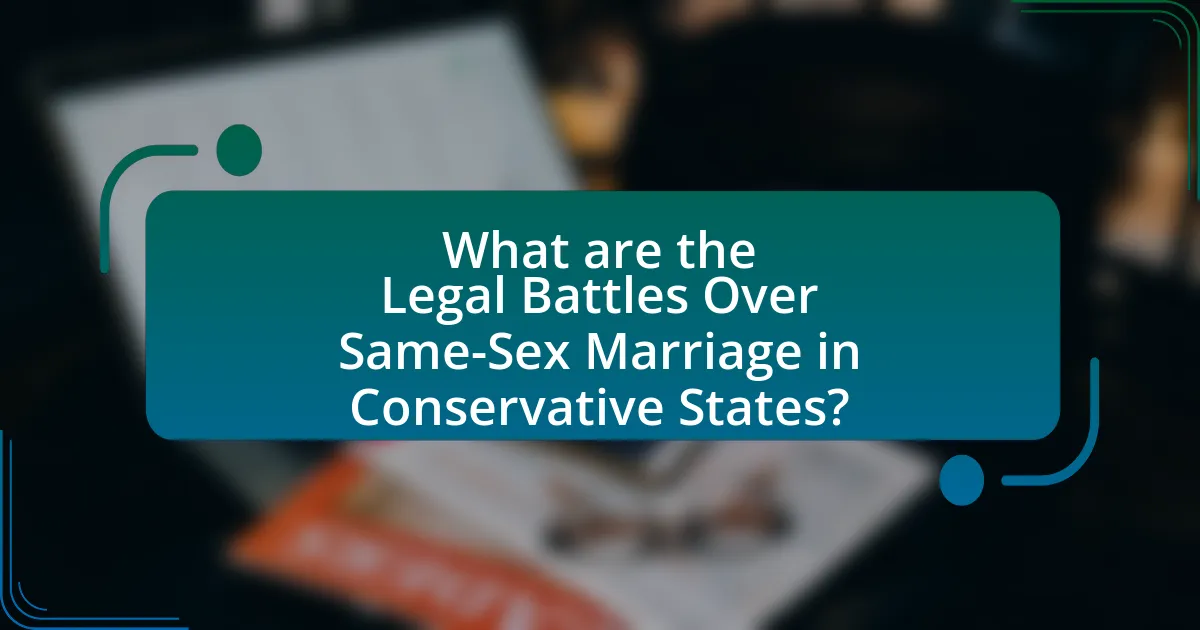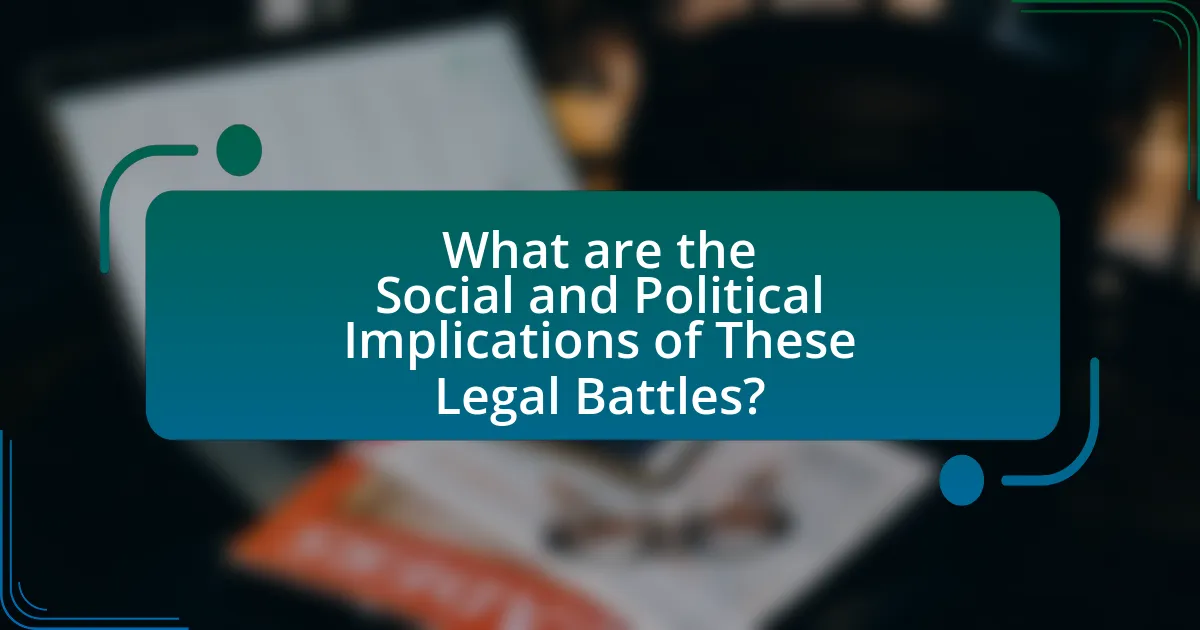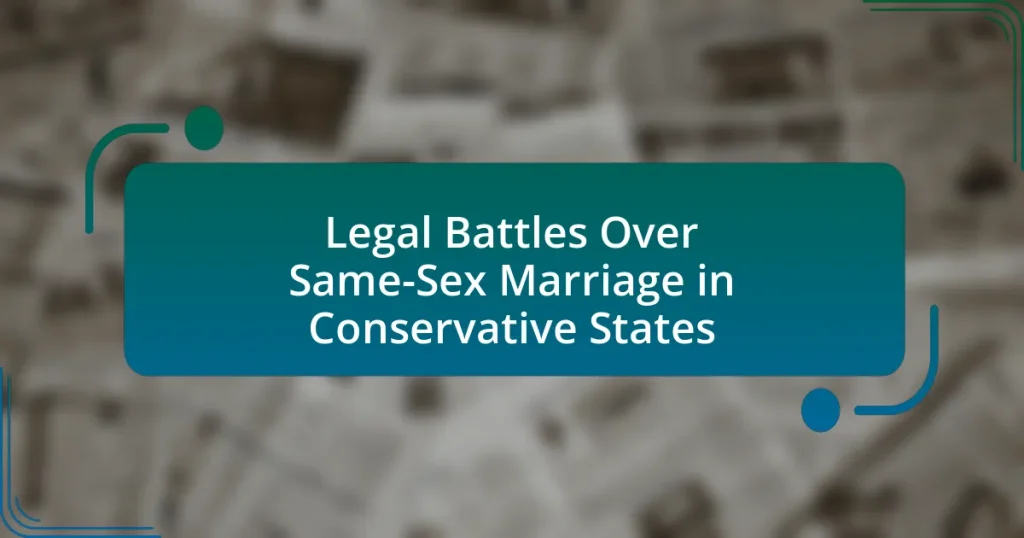The article examines the legal battles surrounding same-sex marriage in conservative states, focusing on the challenges posed by state laws that restrict marriage rights based on sexual orientation. It highlights key events, such as the 2015 Supreme Court decision in Obergefell v. Hodges, which legalized same-sex marriage nationwide, and discusses the ongoing resistance from conservative states through legislative actions and court rulings. The article also explores the cultural, religious, and political factors contributing to this resistance, the impact of landmark legal cases, and the implications for LGBTQ+ communities, activism, and public opinion in these regions.

What are the Legal Battles Over Same-Sex Marriage in Conservative States?
Legal battles over same-sex marriage in conservative states primarily involve challenges to state laws that restrict marriage rights based on sexual orientation. These legal disputes often arise when same-sex couples seek to marry or have their marriages recognized in states that have enacted bans or constitutional amendments against same-sex marriage. For instance, in 2015, the U.S. Supreme Court’s decision in Obergefell v. Hodges legalized same-sex marriage nationwide, yet many conservative states have attempted to circumvent this ruling through legislation or by refusing to issue marriage licenses. Additionally, cases such as those in Alabama and Kentucky have highlighted ongoing resistance, where state officials have faced lawsuits for not complying with federal mandates to recognize same-sex marriages. These legal battles reflect the tension between state laws and federal rulings, illustrating the complexities of marriage equality in regions with conservative values.
How have these legal battles evolved over time?
Legal battles over same-sex marriage in conservative states have evolved significantly since the early 2000s, transitioning from state-level bans to widespread legalization. Initially, many conservative states enacted laws and constitutional amendments prohibiting same-sex marriage, reflecting societal opposition and political resistance. However, landmark rulings, such as the 2015 Supreme Court decision in Obergefell v. Hodges, which legalized same-sex marriage nationwide, catalyzed a shift in legal perspectives. Following this ruling, numerous conservative states faced challenges in enforcing their bans, leading to a series of court cases that often resulted in the invalidation of discriminatory laws. Over time, public opinion has also shifted, with increasing support for same-sex marriage, further influencing legal outcomes and prompting some conservative lawmakers to reconsider their positions. This evolution illustrates a dynamic interplay between legal frameworks, societal attitudes, and political landscapes regarding same-sex marriage in conservative regions.
What key events have shaped the legal landscape for same-sex marriage in conservative states?
Key events that have shaped the legal landscape for same-sex marriage in conservative states include the 2015 Supreme Court decision in Obergefell v. Hodges, which legalized same-sex marriage nationwide, and subsequent state-level legislative actions and court rulings. The Obergefell ruling established that same-sex couples have the constitutional right to marry, directly impacting conservative states that had previously enacted bans. Following this, various conservative states attempted to pass laws or enact constitutional amendments to limit or undermine same-sex marriage rights, but many of these efforts faced legal challenges and were struck down by courts citing the Obergefell precedent. Additionally, public opinion shifts and advocacy efforts have influenced state legislatures, leading to some conservative states recognizing same-sex marriage despite initial resistance.
How have court rulings influenced public opinion on same-sex marriage?
Court rulings have significantly influenced public opinion on same-sex marriage by legitimizing the rights of same-sex couples and shifting societal perceptions. Landmark decisions, such as the U.S. Supreme Court’s ruling in Obergefell v. Hodges in 2015, which legalized same-sex marriage nationwide, have contributed to increased acceptance and support among the public. According to a Gallup poll conducted in 2021, support for same-sex marriage reached an all-time high of 70%, reflecting a notable change in attitudes since the early 2000s when support was below 40%. These rulings have not only provided legal recognition but have also catalyzed broader discussions about equality and civil rights, further shaping public opinion in favor of same-sex marriage.
Why are conservative states resistant to same-sex marriage?
Conservative states are resistant to same-sex marriage primarily due to cultural, religious, and political beliefs that prioritize traditional definitions of marriage. Many conservative constituents view marriage as a sacred institution between a man and a woman, often influenced by religious doctrines that oppose same-sex unions. For instance, surveys indicate that a significant percentage of individuals in conservative regions identify as religious, which correlates with opposition to same-sex marriage. Additionally, political leaders in these states often align with their constituents’ views, leading to legislative actions that seek to restrict or ban same-sex marriage. Historical context shows that states with strong conservative values have enacted laws or constitutional amendments to define marriage strictly as heterosexual, reflecting the prevailing attitudes within those communities.
What cultural and political factors contribute to this resistance?
Cultural and political factors contributing to resistance against same-sex marriage in conservative states include deeply rooted traditional values and political affiliations that prioritize heteronormative family structures. Many conservative communities view same-sex marriage as a challenge to their cultural identity and moral beliefs, often influenced by religious doctrines that oppose LGBTQ+ rights. Politically, conservative lawmakers and organizations mobilize against same-sex marriage by framing it as a threat to family values, which resonates with their voter base. For instance, in states like Alabama and Mississippi, legislative efforts to ban same-sex marriage have been supported by significant portions of the population, reflecting a broader cultural resistance rooted in historical norms and political ideologies that favor traditional marriage.
How do religious beliefs impact the legal battles in these states?
Religious beliefs significantly influence legal battles over same-sex marriage in conservative states by shaping public opinion and legislative actions. In many conservative regions, religious doctrines often oppose same-sex marriage, leading to the enactment of laws that restrict marriage rights based on these beliefs. For instance, states like Alabama and Texas have passed constitutional amendments and statutes that define marriage as a union between one man and one woman, reflecting the predominant religious views in those areas. Additionally, religious organizations actively participate in lobbying efforts against same-sex marriage, mobilizing their congregations to support legal measures that align with their beliefs. This interplay between religious convictions and legal frameworks creates a complex landscape where legal outcomes are often swayed by the prevailing religious sentiments within the community.

What are the Major Legal Cases Involved in These Battles?
The major legal cases involved in the battles over same-sex marriage in conservative states include Obergefell v. Hodges, United States v. Windsor, and Hollingsworth v. Perry. Obergefell v. Hodges (2015) was a landmark Supreme Court case that legalized same-sex marriage nationwide, ruling that state bans on same-sex marriage were unconstitutional under the Fourteenth Amendment. United States v. Windsor (2013) struck down key provisions of the Defense of Marriage Act (DOMA), affirming federal recognition of same-sex marriages. Hollingsworth v. Perry (2013) addressed California’s Proposition 8, which banned same-sex marriage, leading to the reinstatement of same-sex marriage in the state. These cases collectively shaped the legal landscape for same-sex marriage in conservative states and across the United States.
Which landmark cases have defined the legal status of same-sex marriage?
The landmark cases that have defined the legal status of same-sex marriage include Obergefell v. Hodges (2015), United States v. Windsor (2013), and Lawrence v. Texas (2003). Obergefell v. Hodges established the constitutional right to same-sex marriage nationwide, ruling that state bans on same-sex marriage violated the Fourteenth Amendment’s Equal Protection and Due Process Clauses. United States v. Windsor struck down the Defense of Marriage Act (DOMA), which denied federal recognition of same-sex marriages, affirming that the federal government must recognize legally married same-sex couples. Lawrence v. Texas decriminalized same-sex sexual activity, laying the groundwork for later marriage equality decisions by affirming the rights of individuals to engage in private consensual conduct. These cases collectively shaped the legal landscape for same-sex marriage in the United States.
What were the outcomes of these landmark cases?
The outcomes of landmark cases regarding same-sex marriage in conservative states included the legalization of same-sex marriage and the affirmation of equal rights under the law. Notably, the Supreme Court’s decision in Obergefell v. Hodges (2015) established that same-sex marriage is a constitutional right, invalidating state bans and ensuring marriage equality nationwide. This ruling was based on the Fourteenth Amendment’s guarantees of equal protection and due process, fundamentally changing the legal landscape for same-sex couples across the United States.
How did these cases affect subsequent legal challenges in conservative states?
The legal cases regarding same-sex marriage significantly influenced subsequent legal challenges in conservative states by establishing precedents that courts could reference. For instance, the Supreme Court’s decision in Obergefell v. Hodges in 2015 legalized same-sex marriage nationwide, which prompted conservative states to reassess their legal stances and strategies in defending bans on same-sex marriage. Following this ruling, many conservative states faced challenges that cited Obergefell as a basis for arguing against discriminatory practices, leading to a wave of legal actions that sought to align state laws with federal mandates. This shift was evident in cases where lower courts ruled against state bans, reinforcing the legal framework established by Obergefell and compelling conservative states to adapt their policies in response to evolving legal interpretations.
What role do state constitutions play in these legal battles?
State constitutions serve as critical legal frameworks in battles over same-sex marriage in conservative states by establishing the legal rights and definitions that govern marriage within those jurisdictions. For instance, many state constitutions include specific amendments or provisions that define marriage as a union between one man and one woman, which directly impacts the legal standing of same-sex marriage. These constitutional provisions often become focal points in litigation, as advocates for same-sex marriage challenge their validity against federal constitutional protections, such as the Equal Protection Clause. The outcomes of these legal battles can hinge on interpretations of state constitutional language, as seen in cases like Obergefell v. Hodges, where state-level constitutional arguments were pivotal in the broader discussion of marriage equality.
How have state constitutional amendments impacted same-sex marriage rights?
State constitutional amendments have significantly restricted same-sex marriage rights by explicitly defining marriage as a union between one man and one woman in various states. For instance, amendments passed in states like California (Proposition 8 in 2008) and Florida (2008 amendment) not only prohibited same-sex marriage but also aimed to invalidate existing same-sex marriages, creating legal barriers that hindered the recognition of these unions. These amendments often mobilized conservative voter bases and reinforced discriminatory practices, leading to prolonged legal battles that delayed the recognition of same-sex marriage rights until the Supreme Court’s decision in Obergefell v. Hodges in 2015, which ultimately legalized same-sex marriage nationwide.
What are the implications of state versus federal law in these cases?
The implications of state versus federal law in legal battles over same-sex marriage in conservative states primarily revolve around the conflict between state-level restrictions and federal protections. State laws may impose bans or limitations on same-sex marriage, while federal law, particularly following the Supreme Court’s decision in Obergefell v. Hodges (2015), recognizes same-sex marriage as a constitutional right. This creates a legal landscape where individuals may face differing rights and protections depending on their state of residence, leading to potential legal challenges and inconsistencies in the application of marriage rights across the country. The tension between state sovereignty and federal authority can result in significant legal disputes, as seen in cases where state laws are challenged in federal courts, ultimately influencing the broader discourse on civil rights and equality.

What are the Social and Political Implications of These Legal Battles?
The social and political implications of legal battles over same-sex marriage in conservative states include heightened polarization, shifts in public opinion, and potential changes in legislative priorities. These legal disputes often reflect and exacerbate existing societal divisions, as they challenge traditional views on marriage and family structures. For instance, states that resist recognizing same-sex marriage may face backlash from more progressive constituents, leading to increased activism and advocacy for LGBTQ+ rights. Additionally, these battles can influence political campaigns, as candidates may leverage the issue to galvanize support or opposition, impacting election outcomes. Historical data shows that states with legal challenges to same-sex marriage often experience significant shifts in public sentiment, as seen in the 2015 Supreme Court ruling in Obergefell v. Hodges, which legalized same-sex marriage nationwide and prompted a reevaluation of state-level policies.
How do these legal battles affect LGBTQ+ communities in conservative states?
Legal battles over same-sex marriage significantly impact LGBTQ+ communities in conservative states by creating an environment of uncertainty and fear. These legal disputes often lead to fluctuating protections and rights for LGBTQ+ individuals, resulting in increased discrimination and social stigma. For instance, in states where same-sex marriage is contested, LGBTQ+ individuals may face challenges in accessing essential services, such as healthcare and housing, due to the lack of legal recognition. Furthermore, studies indicate that such legal conflicts can exacerbate mental health issues within these communities, as individuals navigate a landscape where their rights are not consistently upheld.
What are the psychological impacts of ongoing legal disputes on LGBTQ+ individuals?
Ongoing legal disputes significantly impact the psychological well-being of LGBTQ+ individuals, often leading to increased stress, anxiety, and feelings of marginalization. Research indicates that the uncertainty and prolonged nature of legal battles can exacerbate mental health issues, as individuals may experience a sense of helplessness and fear regarding their rights and acceptance in society. For instance, a study published in the American Journal of Public Health found that LGBTQ+ individuals involved in legal disputes reported higher levels of psychological distress compared to those not engaged in such conflicts. This distress is often compounded by societal stigma and discrimination, which can further isolate individuals and diminish their overall quality of life.
How do these battles influence activism and advocacy efforts?
Legal battles over same-sex marriage in conservative states significantly influence activism and advocacy efforts by mobilizing public support and raising awareness about LGBTQ+ rights. These legal disputes often highlight injustices faced by same-sex couples, prompting grassroots movements and organized campaigns that seek to challenge discriminatory laws. For instance, the 2015 Supreme Court ruling in Obergefell v. Hodges, which legalized same-sex marriage nationwide, galvanized activists to push for broader civil rights protections, demonstrating how legal victories can serve as catalysts for further advocacy. Additionally, ongoing legal challenges in conservative states continue to energize local and national organizations, fostering coalitions that advocate for equality and social change.
What strategies are being employed by advocates for same-sex marriage?
Advocates for same-sex marriage employ legal challenges, public awareness campaigns, and coalition-building as their primary strategies. Legal challenges involve filing lawsuits to contest discriminatory laws, as seen in cases like Obergefell v. Hodges, which led to the Supreme Court’s legalization of same-sex marriage nationwide in 2015. Public awareness campaigns aim to shift societal attitudes by sharing personal stories and highlighting the benefits of marriage equality, effectively mobilizing public support. Coalition-building involves partnering with various organizations, including civil rights groups and faith-based communities, to create a united front that amplifies their message and increases political pressure on lawmakers. These strategies collectively work to advance the cause of same-sex marriage, particularly in conservative states where legal and social opposition remains strong.
How are grassroots movements shaping the conversation around same-sex marriage?
Grassroots movements are significantly shaping the conversation around same-sex marriage by mobilizing local communities to advocate for legal recognition and equality. These movements often utilize social media campaigns, community organizing, and public demonstrations to raise awareness and influence public opinion. For instance, organizations like the Human Rights Campaign and local LGBTQ+ advocacy groups have successfully engaged citizens in discussions about the importance of marriage equality, leading to increased support in various conservative states. According to a 2020 Gallup poll, support for same-sex marriage in the U.S. reached 67%, reflecting the impact of grassroots efforts in changing societal attitudes.
What role do national organizations play in supporting local efforts?
National organizations play a crucial role in supporting local efforts by providing resources, legal expertise, and advocacy strategies. These organizations often mobilize funding and manpower to assist local groups in their legal battles, such as those surrounding same-sex marriage in conservative states. For instance, the Human Rights Campaign has been instrumental in offering legal support and public awareness campaigns that empower local activists to challenge discriminatory laws. This collaboration enhances the effectiveness of local efforts by leveraging national visibility and expertise, ultimately contributing to significant legal victories and policy changes at the state level.
What can individuals do to support same-sex marriage rights in conservative states?
Individuals can support same-sex marriage rights in conservative states by actively participating in advocacy efforts, such as joining local LGBTQ+ organizations and attending rallies. Engaging in grassroots campaigns can amplify voices for equality, as demonstrated by the success of organizations like the Human Rights Campaign, which mobilizes community support and raises awareness about legal challenges. Additionally, individuals can contact their elected representatives to express support for same-sex marriage legislation, as public pressure has historically influenced policy changes, evidenced by the shift in public opinion towards marriage equality over the past two decades. Supporting businesses that advocate for LGBTQ+ rights also contributes to a culture of acceptance and can lead to broader societal change.


